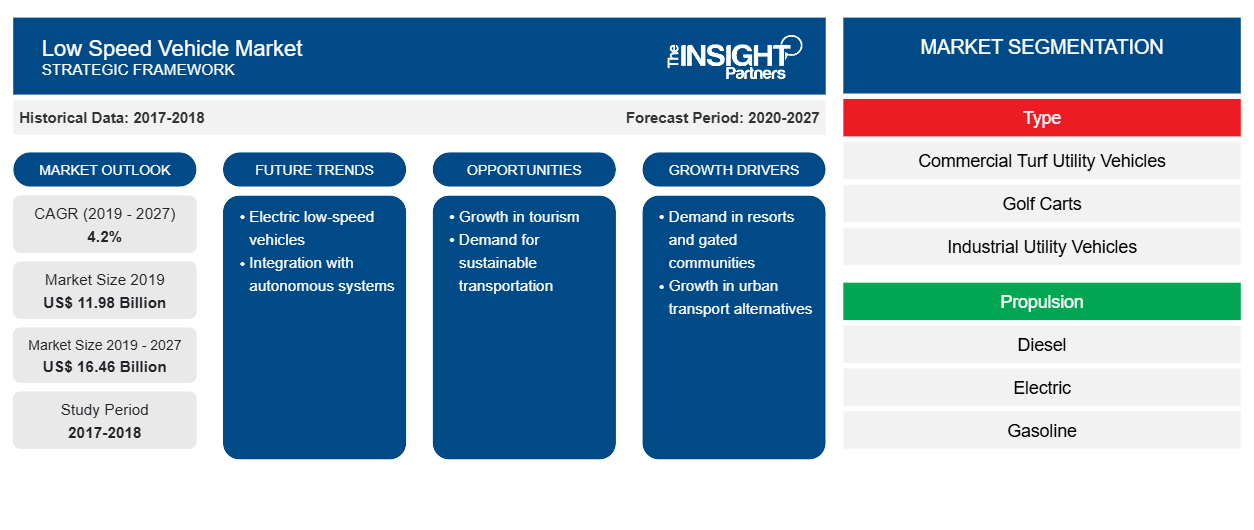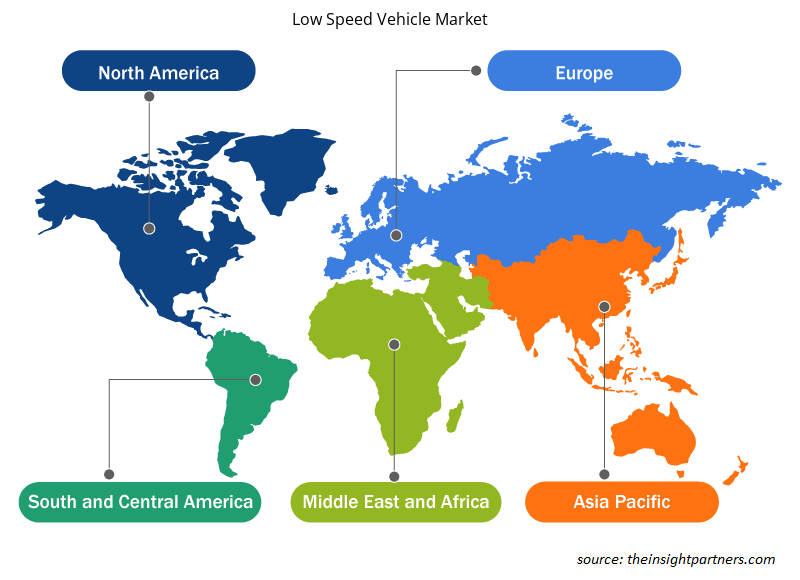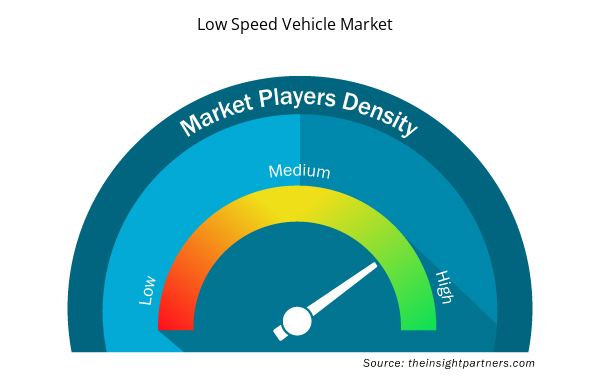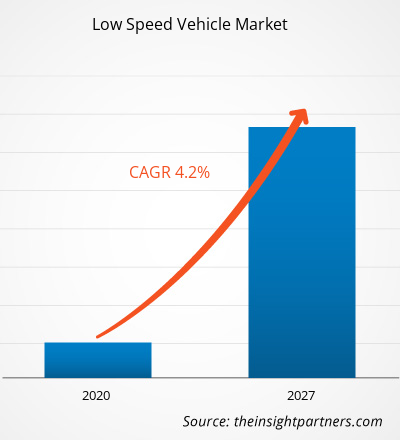The low speed vehicle market was valued at US$ 11.98 Billion in 2019 and is expected to grow at a CAGR of 4.2% from 2020 to 2027 to reach US$ 16.46 Billion by 2027.
The low speed vehicle market has witnessed eminent growth in the last couple of years globally. The positive economic outlook, rising disposable incomes, and growing population are among the factors that are driving the demand for infrastructure projects. Also, pertaining to high volume of online orders, the e-commerce industry is growing which would result into more ownership of warehouse in the region. Low speed vehicles within the warehouse supports in shifting the boxes form one place to another. Above-mentioned factors plays a major role in accelerating the low speed vehicle market growth. The APAC held the largest market share in 2019 and is anticipated to be the fastest growing region in the low speed vehicle market. North America and Europe are the second and third largest region in the low speed market.
Coronavirus outbreak began in Wuhan (China) during December 2019. It has been spreading at a fast pace across the world and some of the worst affected countries include China, Italy, Iran, Spain, republic of Korea, France, Germany, and the US. The outbreak of COVID-19 and its resulting effects such as border lockdowns, shutdowns, travel bans have started to impact businesses across various industries. The low speed vehicle market is anticipated to have a medium impact owing to the disruptions in the global supply chains. The companies operating in this market will see a drop in overall sales in the short term (3-6 months), however, the market will see a steady growth in the coming years.
Customize This Report To Suit Your Requirement
You will get customization on any report - free of charge - including parts of this report, or country-level analysis, Excel Data pack, as well as avail great offers and discounts for start-ups & universities
Low Speed Vehicle Market: Strategic Insights

- Get Top Key Market Trends of this report.This FREE sample will include data analysis, ranging from market trends to estimates and forecasts.
You will get customization on any report - free of charge - including parts of this report, or country-level analysis, Excel Data pack, as well as avail great offers and discounts for start-ups & universities
Low Speed Vehicle Market: Strategic Insights

- Get Top Key Market Trends of this report.This FREE sample will include data analysis, ranging from market trends to estimates and forecasts.
Market Insights
Rising government initiatives to encourage sustainable transportation
European Union, China, Japan, Canada, India, and South Korea are some of the major geographies where governments are proactively taking steps to increase the adoption of electric vehicles. For instance, in the European Union, significant improvements were made in fuel economy standards for existing vehicle. A ‘Clean Vehicles Directive’ was formulated for the procurement of electric buses by government sector. Another directive called ‘Energy Performance Buildings Directive’ is also formed which sets minimum standards for setting up charging infrastructure in buildings.
Propulsion Insights
The low speed vehicle market, by propulsion, is segmented into diesel, electric, and gasoline. The fuel-powered segment captured a dominating share in the global low speed vehicle market. There has been growing trend of high power vehicles that are capable to move on the permissible roads and can be utilized as utility vehicles and personnel carriers. Hence, during the forecast period, electric low speed vehicles are projected to have significant growth, along with high-power low speed vehicles which in turn is expected to eventually drive the low speed vehicle market.
Type Insights
The low speed vehicle market, by type, is segmented into commercial turf utility vehicles, golf carts, industrial utility vehicles, and personnel carriers. The golf carts segment captured a dominating share in the global low speed vehicle market. Several communities in the United States depend heavily on low-speed electric vehicles to get around. For older people walking can sometimes be difficult while driving a car can be burdensome and even unsafe.
Market initiative and new development strategies are commonly adopted by companies to expand their footprint worldwide and meet the growing demand. These strategies are mostly observed in North America and Europe. The players present in the low speed vehicle market adopt the strategy of expansion and investment in research and development to enlarge customer base across the world, which also permits the players to maintain their brand name globally.
Low Speed Vehicle Market Regional Insights
The regional trends and factors influencing the Low Speed Vehicle Market throughout the forecast period have been thoroughly explained by the analysts at Insight Partners. This section also discusses Low Speed Vehicle Market segments and geography across North America, Europe, Asia Pacific, Middle East and Africa, and South and Central America.

- Get the Regional Specific Data for Low Speed Vehicle Market
Low Speed Vehicle Market Report Scope
| Report Attribute | Details |
|---|---|
| Market size in 2019 | US$ 11.98 Billion |
| Market Size by 2027 | US$ 16.46 Billion |
| Global CAGR (2019 - 2027) | 4.2% |
| Historical Data | 2017-2018 |
| Forecast period | 2020-2027 |
| Segments Covered |
By Type
|
| Regions and Countries Covered | North America
|
| Market leaders and key company profiles |
Low Speed Vehicle Market Players Density: Understanding Its Impact on Business Dynamics
The Low Speed Vehicle Market is growing rapidly, driven by increasing end-user demand due to factors such as evolving consumer preferences, technological advancements, and greater awareness of the product's benefits. As demand rises, businesses are expanding their offerings, innovating to meet consumer needs, and capitalizing on emerging trends, which further fuels market growth.
Market players density refers to the distribution of firms or companies operating within a particular market or industry. It indicates how many competitors (market players) are present in a given market space relative to its size or total market value.
Major Companies operating in the Low Speed Vehicle Market are:
- Bintelli Electric Vehicle
- Club Car, LLC
- Cruise Car, Inc.,
- Deere & Company
- HDK Co., Ltd.
Disclaimer: The companies listed above are not ranked in any particular order.

- Get the Low Speed Vehicle Market top key players overview
Low speed vehicle Market – By Type
- Commercial Turf Utility Vehicles
- Golf Carts
- Industrial Utility Vehicles
- Personnel Carriers
Low speed vehicle Market – By Propulsion
- Diesel
- Electric
- Gasoline
Low speed vehicle Market – By Geography
North America
- US
- Canada
- Mexico
Europe
- France
- Germany
- Italy
- UK
- Russia
- Rest of Europe
Asia Pacific
- China
- India
- Australia
- South Korea
- Japan
- Rest of Asia Pacific
Middle East & Africa
- South Africa
- Saudi Arabia
- UAE
- Rest of Middle East and Africa
South America
- Brazil
- Argentina
- Rest of South America
Company Profiles
- Bintelli Electric Vehicle
- Club Car, LLC
- Cruise Car, Inc.,
- Deere & Company
- HDK Co., Ltd.
- Moto Electric Vehicles
- Polaris Inc.
- Textron Specialized Vehicles Inc.
- The Toro Company
- Yamaha Golf-Car Company
- Historical Analysis (2 Years), Base Year, Forecast (7 Years) with CAGR
- PEST and SWOT Analysis
- Market Size Value / Volume - Global, Regional, Country
- Industry and Competitive Landscape
- Excel Dataset



Report Coverage
Revenue forecast, Company Analysis, Industry landscape, Growth factors, and Trends

Segment Covered
Type ; Propulsion and Geography

Regional Scope
North America, Europe, Asia Pacific, Middle East & Africa, South & Central America

Country Scope
Argentina, Australia, Brazil, Canada, China, France, Germany, India, Italy, Japan, Mexico, Russian Federation, Saudi Arabia, South Africa, South Korea, United Arab Emirates, United Kingdom, United States
Frequently Asked Questions
Which type segment hold the major share in the global low speed vehicle market?
In 2019, the golf carts segment led the low speed vehicle market by type and it is anticipated to continue its dominance during the forecast period of 2020 to 2027. The golf carts are available in different types, such as gas and electric golf carts. Several communities in countries like United States depend heavily on low-speed electric vehicles to get around.
What are the future opportunities for low speed vehicle market?
Over the past few years, electric mobility has been growing at an unprecedented rate across major economies. Due to increasing concerns regarding environmental protection and favorable government policies, the sales figures of electric vehicles has seen an impressive surge in the past decade. Better fuel economy standards and zero & low emission vehicle incentives are some of the measures which are taken to lower the carbon emission level in the environment. This factor is anticipated to provide growth opportunities for the low speed vehicle market during the forecast period of 2020 to 2027.
What are reasons behind the growth of low speed vehicle market in the Asia-Pacific region?
The rising smart mobility service adoption, rapid urbanization, and increasing construction industry as well as government incentives to encourage sales of electric vehicles and high awareness regarding nonconventional fuel-driven vehicles in Asia are among the major factors boosting the low speed vehicle market growth in this region.
Trends and growth analysis reports related to Automotive and Transportation : READ MORE..
The List of Companies - Low Speed Vehicle Market
- Bintelli Electric Vehicle
- Club Car, LLC
- Cruise Car, Inc.,
- Deere & Company
- HDK Co., Ltd.
- Moto Electric Vehicles
- Polaris Inc.
- Textron Specialized Vehicles Inc.
- The Toro Company
- Yamaha Golf-Car Company

 Get Free Sample For
Get Free Sample For